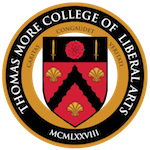By Cassandra Taylor, Publications Assistant
For most TMC students, Don Quixote is a work to be read and enjoyed in the normal course of the Humanities V curriculum. For John Anderson ’26, however, the Spanish tome became the focal point of his third year at the College, having chosen Miguel de Cervantes’s magnum opus as the subject of his Junior Project.
“I chose Don Quixote because I immensely enjoyed it in class and was filled with awe that Cervantes was able to make me laugh, while still being deeply profound, teaching me about myself and human nature,” Mr. Anderson commented. “I didn’t know that authors were allowed to do that before reading this Spanish masterpiece.”

In the College’s program of studies, the beauty of the Junior Project is that it allows the TMC student to delve more deeply into a worthy work, which may or may not already be included in the broader curriculum. Spending months with a single text under the guidance of a faculty advisor allows the student to “demonstrate[] that he has been attentive not only for a semester, but has worked to integrate the knowledge of his various courses with the emergent interests that he has in a particular area.” Those emergent interests—or new ones!—are further developed the following year through the student’s writing, presentation, and defense of a Senior Thesis.
“The Senior Thesis is the students’ major defense and the culmination of their education. The Junior Project is their minor defense,” explained Fellow and Dean Dr. Denis Kitzinger. “It is a noble and fitting exercise at a time when the fruit of their education begins to strike roots, when the ‘skills of analysis, judgment, and exposition’ (College Catalogue) direct the student’s love of learning to a mature engagement with a great work and an eloquent and persuasive presentation of his insights. It requires fortitude and self-control, and it builds on discipline joined to the desire to know sustained over a semester of independent study. It calls upon the student to demonstrate those virtues he has been cultivating throughout his course of study: wisdom and eloquence, insight, clarity, order, and charm in thought and conversation.
“It is a joy to see the intellectual character of each class reflected in their Junior Project choices,” Dr. Kitzinger continued. “Their intellectual eros, their desire to know, their wonder, comes out. While we usually see a healthy balance between theological and philosophical, as well as literary and historical texts—including classical, premodern, and modern writers—this year’s class favored literary subjects. I was struck by the variety of great works: from Homer to G.K. Chesterton, from Beowulf to The Waste Land.”

The undertaking of a Junior Project also provides the student with a unique opportunity: the chance to discuss a favorite work with respected faculty members, which can uncover new questions to revisit the next time the student returns to the text. “What I found most rewarding about the process was what I learned from the actual defense,” Mr. Anderson reflected. “The conversation with the professors on my panel gave me both a larger perspective and much to think about in future readings of Don Quixote.”
“As with any of the Great Books we explore in the curriculum, Don Quixote couldn’t possibly be exhausted in just one reading or over the course of a few weeks of class. That time is rather aimed at opening up a world to the student, which they may continue to explore throughout their life,” remarked Teaching Fellow and Dean of Students Dr. Michael Taylor, who served as Mr. Anderson’s advisor. “The Junior Project is a beautiful opportunity for faculty and students to come together in a moment of leisure to explore that world. When done well, it is a microcosm of the Thomas More College education on the whole in which, for the love of learning and in conversation with each other and the great figures of history, the joy of the intellectual life animates our common life together.”

Winter Session:
- Anna Yost: Till We Have Faces by C.S. Lewis
- Daniel Cook: Wind, Sand and Stars by Antoine de Saint-Exupéry
- Emilie Gaeta: Passion of Saints Perpetua and Felicity by St. Vibia Perpetua
- Helen Presberg: “White Nights” by Fyodor Dostoevsky
- Kathrin Hahs: The Great Gatsby by F. Scott Fitzgerald
- Mary-Grace Grinstead: Story of a Soul by St. Therese of Lisieux
- Paul Bundy: The Tempest by William Shakespeare
- Sarah Carter: On the Consolation of Philosophy by Boethius
Spring Session:
- Anastasia Shanahan: “The Birthmark” and other stories by Nathaniel Hawthorne
- Catherine Gath: The Wasteland by T.S. Eliot
- David Arias: “Friendship” in the Nicomachean Ethics by Aristotle
- Jacinta Sigaud: Brideshead Revisited by Evelyn Waugh
- John Anderson: Don Quixote by Miguel de Cervantes
- John-Paul Prophet: The Killer Angels by Michael Shaara
- Kevin Conner: The Iliad of Homer
- Logan Basta: Democracy in America by Alexis de Tocqueville
- Sofia Seidl: All Quiet on the Western Front by Erich Maria Remarque
- Therese Potvin: The Power and the Glory by Graham Greene
- Tynan Roth: Beowulf
- Wynona Hogan: Magic by G.K. Chesterton
For further reading:
